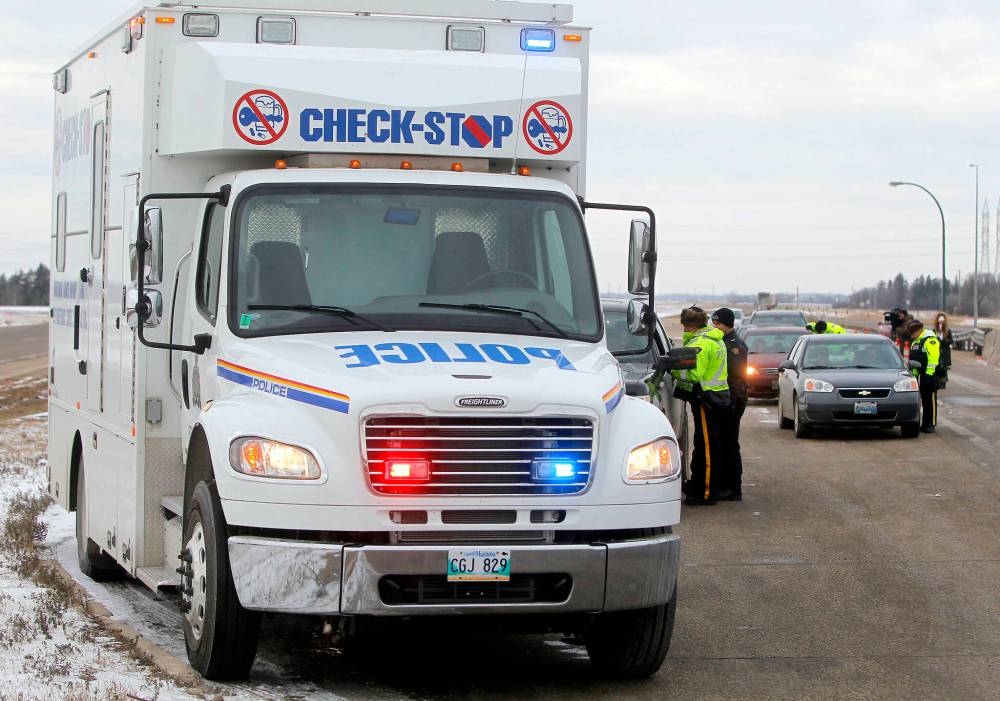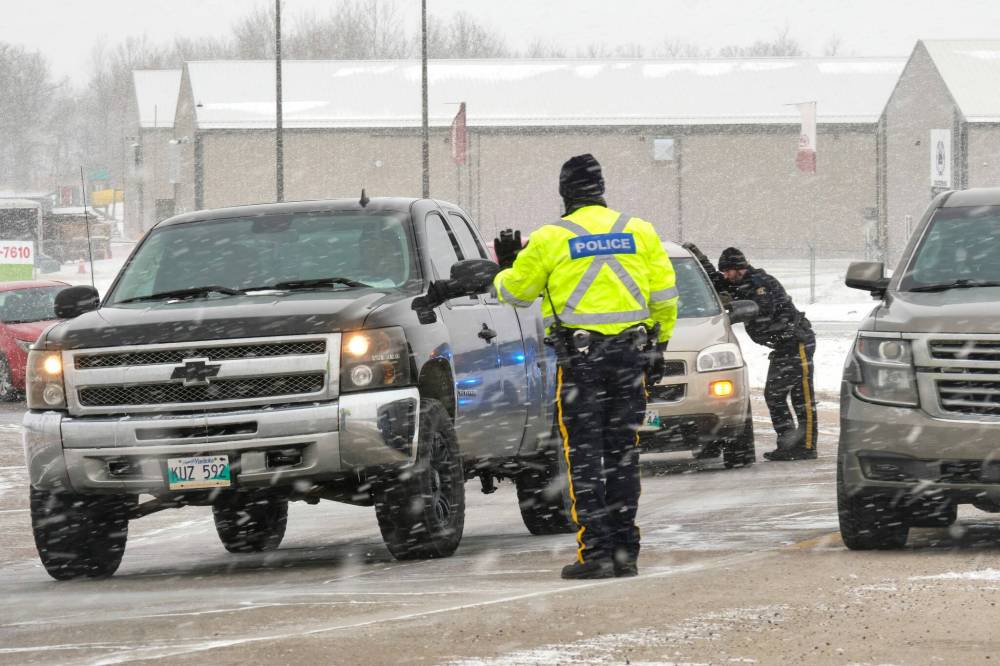Licence to unlicense
Immediate roadside prohibition program prioritizes safety by getting impaired drivers off the road, sending clear message while taking pressure off justice system, advocates say
Advertisement
Read this article for free:
or
Already have an account? Log in here »
To continue reading, please subscribe:
Monthly Digital Subscription
$0 for the first 4 weeks*
- Enjoy unlimited reading on winnipegfreepress.com
- Read the E-Edition, our digital replica newspaper
- Access News Break, our award-winning app
- Play interactive puzzles
*No charge for 4 weeks then price increases to the regular rate of $19.95 plus GST every four weeks. Offer available to new and qualified returning subscribers only. Cancel any time.
Monthly Digital Subscription
$4.99/week*
- Enjoy unlimited reading on winnipegfreepress.com
- Read the E-Edition, our digital replica newspaper
- Access News Break, our award-winning app
- Play interactive puzzles
*Billed as $19.95 plus GST every four weeks. Cancel any time.
To continue reading, please subscribe:
Add Free Press access to your Brandon Sun subscription for only an additional
$1 for the first 4 weeks*
*Your next subscription payment will increase by $1.00 and you will be charged $16.99 plus GST for four weeks. After four weeks, your payment will increase to $23.99 plus GST every four weeks.
Read unlimited articles for free today:
or
Already have an account? Log in here »
Hey there, time traveller!
This article was published 30/12/2024 (373 days ago), so information in it may no longer be current.
Immediate and significant — but not criminal — consequences for people caught behind the wheel with booze on their breath isn’t seen as a watered-down approach to the problem by an organization that exists to get impaired drivers off the street.
It’s not automatic that a driver who blows over the legal limit is slapped with cuffs and criminal charges; police in Manitoba have, since 2019, been able to issue immediate roadside prohibitions as an alternative to a criminal charge.
The heavy-handed IRP punishments are delivered on the spot.
MPI data showed that 929 drivers were handed immediate roadside prohibitions (IRPs) in 2020. That number rose to 1,440 in 2023 and is on pace to meet or exceed it in 2024.“The measures, the sanctions, are quite meaningful,” said MADD Canada CEO Steve Sullivan.
“The program Manitoba is using is an effective program. It’s immediate, but it’s also consistent. Everyone is going to get the same penalties, as opposed to the criminal process where you might be convicted six months down the road, you might have the case pled down, it might be stayed because of time delays. There’s not as much certainty.”
IRPs can be issued if a motorist registers a fail reading — a blood-alcohol concentration equal to or over .08 — on a roadside approved screening device. They can also be issued if a driver registers a warn reading — a blood-alcohol concentration between .05 and .079.
Multiple factors come into play when police decide to issue an IRP rather than a criminal charge, including whether it’s an individual’s first offence, whether a collision, injury or death resulted, or if a sample requested was refused.
A motorist issued an IRP is immediately handed a three-month driving ban.
Other sanctions can include a $700 administrative penalty, mandatory ignition interlock for one year, an impaired driving assessment ($625 at individual’s expense), vehicle impoundment and a 10-level drop on Manitoba Public Insurance’s driver safety rating scale.
On one hand, some think the roadside penalties are soft because they typically don’t result in a criminal record.
On the other, the driver is punished right away and faces a confusing and complex process if they’ve been unjustly suspended.
Criminal lawyers suggest IRPs limit individuals’ ability to defend themselves and test the allegations in court; they question whether drivers are considered guilty before proven innocent.
“Absolutely, you can fight it,” said Matt Gould, a criminal lawyer with Brodsky Amy & Gould specializing in impaired-driving offences. “But there are obstacles in the way, so you really have to know what you’re doing in order to defend yourself.”
B.C. was the first province in the country to usher in IRPs in 2010. Since then, Alberta, Saskatchewan, Manitoba and the Yukon have rolled out similar legislation. On Jan. 1, New Brunswick will become the sixth jurisdiction.
“To avoid all of these consequences, there is one simple solution — choose to drive sober and get home safely,” an MPI spokesperson said.
IRPs, which cannot be upgraded to criminal charges, can be appealed through a registrar review administered by MPI.
Drivers may apply for a review within one year of being served a suspension at a cost of $100 for an in-person hearing and $50 for a written submission.
If the registrar determines the suspension was unjustified, the incident — including fines, demerits, etc. — is removed from the driver’s record.
However, few people fight IRPs.
MPI data shows that just 79 of the 1,440 (5.5 per cent) issued in the province in 2023 were contested via a registrar review.
“Procedural protection issues should concern Manitobans,” said Chris Gamby, a criminal lawyer at Brennan Partners LLP.
Criminal lawyers, including Gamby and Gould, argue the process is muddled and limited.
By the numbers
Manitoba Public Insurance IRP suspensions by year:
- 2020 – 929
- 2021 – 1,006
- 2022 – 1,290
- 2023 – 1,440
- 2024 – 1,393 (as of Dec. 12)
IRP registrar reviews:
- 2020 – 41
- 2021 – 55
- 2022 – 56
- 2023 – 79
- 2024 – 51 (as of Dec. 12)
Winnipeg Police Service IRP suspensions issued:
- 2020 – 72
- 2021 – 78
- 2022 – 122
- 2023 – 168
- 2024 – 199 (as of Dec. 20)
RCMP IRP suspensions issued:
- 2022 – 806
- 2023 – 906
- 2024 – 866 (YTD as of Dec. 26)
“In a criminal impaired (case), an officer can say they heard this or were told this, and maybe it’s accurate, and maybe it’s not, and you exercise your right to challenge that, get an officer on the stand telling his version and you cross-examine them,” Gould said.
That doesn’t happen with MPI adjudicated cases, where an officer’s version of events comes in the form of a sworn statement, he said.
“And the end result, good or bad, can be frustrating because they don’t say why they came to a decision,” he said. “In provincial court, they will give you a reason. (MPI) just gives you a standard paragraph, either overturning or upholding the suspension.”
Sullivan understands that IRPs can be viewed as softer on crime but says there’s very little evidence to suggest that a criminal conviction is a game-changer for people when it comes to altering behaviour.
“For police, Crowns and jurisdictions that have done it traditionally, it’s a bit of a shift in mindset,” he said.
Winnipeg Police Service Patrol Sgt. Stephane Fontaine, impaired driving countermeasures co-ordinator, said the consequences mimic those of a criminal charge, minus the potential for a criminal record.
It has also freed up police to find the next offender by streamlining the process.
What used to tie up officers for hours now takes minutes.
“It’s a huge relief to the backlog at the criminal level as well… and still results in the removal of the impaired driver from the streets with some serious consequences attached to that,” Fontaine said.

Since inception, IRPs have risen by 55 per cent in the province where, on average, 25 people are killed every year in collisions involving drinking and driving.
Before and after
WPS DUI criminal charges pre-IRP legislation:
- 2014 – 510
- 2015 – 535
- 2016 – 479
- 2017 – 440
- 2018 – 442
- 2019 – 383
WPS DUI criminal charges post-IRP legislation:
- 2020 – 287
- 2021 – 310
- 2022 – 336
- 2023 – 350
- 2024 – 440 (YTD as of Dec. 30)
MPI data showed that 929 drivers were handed IRPs in 2020, a number that rose to 1,440 in 2023 and is on pace to meet or exceed it in 2024.
IRPs in Winnipeg have more than doubled since inception.
WPS issued 72 in 2020, which may triple by the time the calendar flips to 2025, with 199 issued already, according to data as recent as the middle of December and during the annual holiday checkstop program.
“All of these people would have been processed through the criminal courts before the introduction of IRP,” a WPS spokesperson said.
scott.billeck@freepress.mb.ca

Scott Billeck is a general assignment reporter for the Free Press. A Creative Communications graduate from Red River College, Scott has more than a decade’s worth of experience covering hockey, football and global pandemics. He joined the Free Press in 2024. Read more about Scott.
Every piece of reporting Scott produces is reviewed by an editing team before it is posted online or published in print — part of the Free Press‘s tradition, since 1872, of producing reliable independent journalism. Read more about Free Press’s history and mandate, and learn how our newsroom operates.
Our newsroom depends on a growing audience of readers to power our journalism. If you are not a paid reader, please consider becoming a subscriber.
Our newsroom depends on its audience of readers to power our journalism. Thank you for your support.
History
Updated on Tuesday, December 31, 2024 9:44 AM CST: Adds figures for WPS DUI criminal charges before and after IRP legislation
Updated on Tuesday, December 31, 2024 10:06 AM CST: Adds RCMP IRP figures










